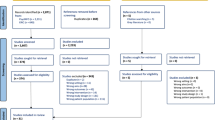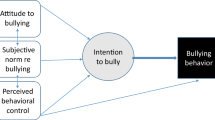Abstract
The purpose of this study was to evaluate the efficacy of a workplace parenting intervention aimed at reducing work–family conflict and improving work and family functioning in teachers. One hundred and seven teachers (who were also parents) were randomly allocated to either a Workplace Triple P intervention condition or a waitlist control condition. Analyses indicated the intervention had a positive effect on a range of occupational variables including work-to-family conflict, family-to-work conflict, occupational stress and teaching efficacy. Intervention effects were also found for family- and personal adjustment-related variables including dysfunctional parenting styles, child behaviour, parenting efficacy, and depression and anxiety. Small to large effect sizes were obtained (Cohen’s d = .34–.85), and all intervention effects were maintained at 4-month follow-up. The results indicate that a parenting intervention can reduce work–family conflict and occupational stress and improve family functioning in teachers balancing work and family. The implications for supporting teachers with family interventions delivered in the workplace are discussed.

Similar content being viewed by others
References
Allen, T. D., & Armstrong, J. (2006). Further examination of the link between work–family conflict and physical health the role of health-related behaviors. American Behavioral Scientist, 49(9), 1204–1221.
Allen, T. D., Herst, D. E. L., Bruck, C. S., & Sutton, M. (2000). Consequences associated with work-to-family conflict: A review and agenda for future research. Journal of Occupational Health Psychology, 5(2), 278–308.
Arnold, D. S., O’Leary, S. G., Wolff, L. S., & Acher, M. M. (1993). The Parenting Scale: A measure of dysfunctional parenting in discipline situations. Psychological Assessment, 5, 137–144.
Austin, V., Shah, S., & Muncer, S. (2005). Teacher stress and coping strategies used to reduce stress: Occupational Therapy International, 12(2), 63–80.
Boyar, S. L., Maertz, C. P., Jr, & Pearson, A. W. (2005). The effects of work–family conflict and family-work conflict on nonattendance behaviors. Journal of Business Research, 58(7), 919–925.
Brough, P., O’Driscoll, M. P., & Kalliath, T. J. (2005). The ability of ‘family friendly’ organizational resources to predict work–family conflict and job and family satisfaction. Stress and Health: Journal of the International Society for the Investigation of Stress, 21(4), 223–234.
Byron, K. (2005). A meta-analytic review of work–family conflict and its antecedents. Journal of Vocational Behavior, 67(2), 169–198.
Casper, W. J., Eby, L. T., Bordeaux, C., Lockwood, A., & Lambert, D. (2007). A review of research methods in IO/OB work–family research. Journal of Applied Psychology, 92(1), 28–43.
Cinamon, R. G., & Rich, Y. (2010). Work family relations: Antecedents and outcomes. Journal of Career Assessment, 18(1), 59–70.
Cinamon, R. G., Rich, Y., & Westman, M. (2007). Teachers’ occupation-specific work–family conflict. The Career Development Quarterly, 55(3), 249–261.
Cook, A. (2009). Connecting work–family policies to supportive work environments. Group & Organization Management, 34(2), 206–240.
Costigan, C. L., Cox, M. J., & Cauce, A. M. (2003). Work-parenting linkages among dual-earner couples at the transition to parenthood. Journal of Family Psychology, 17(3), 397–408.
Drugli, M. B., & Larsson, B. (2006). Children aged 4–8 years treated with parent training and child therapy because of conduct problems: Generalisation effects to day-care and school settings. European Child and Adolescent Psychiatry, 15(7), 392–399.
Eby, L. T., Casper, W. J., Lockwood, A., Bordeaux, C., & Brinley, A. (2005). Work and family research in IO/OB: Content analysis and review of the literature (1980–2002). Journal of Vocational Behavior, 66(1), 124–197.
Eyberg, S. (1992). Parent and teacher behavior inventories for the assessment of conduct problem behaviors in children. In L. VandeCreek & S. Knapp (Eds.), Innovations in clinical practice: A source book (Vol. 11, pp. 261–270). Sarasota, FL: Professional Resource Press/Professional Resource Exchange, Inc.
Ford, M. T., Heinen, B. A., & Langkamer, K. L. (2007). Work and family satisfaction and conflict: A meta-analysis of cross-domain relations. Journal of Applied Psychology, 92(1), 57–80.
Frone, M. R. (2000). work–family conflict and employee psychiatric disorders: The national comorbidity survey. Journal of Applied Psychology, 85(6), 888–895.
Frone, M. R., Russell, M., & Cooper, M. L. (1997a). Relation of work–family conflict to health outcomes: A four-year longitudinal study of employed parents. Journal of Occupational & Organizational Psychology, 70(4), 325–335.
Frone, M. R., Yardley, J. K., & Markel, K. S. (1997b). Developing and testing an integrative model of the work–family interface. Journal of Vocational Behavior, 50(2), 145–167.
Golden, T. D., Veiga, J. F., & Simsek, Z. (2006). Telecommuting’s differential impact on work–family conflict: Is there no place like home? Journal of Applied Psychology, 91(6), 1340–1350.
Greenhaus, J. H., & Beutell, N. J. (1985). Sources of conflict between work and family roles. Academy of Management Review, 10(1), 76.
Haar, J. M. (2004). Work–family conflict and turnover intention: Exploring the moderation effects of perceived work–family support. New Zealand Journal of Psychology, 33(1), 35–39.
Hartung, D., & Hahlweg, K. (2010). Strengthening parent well-being at the work-family interface: A German trial on Workplace Triple P. Journal of Community & Applied Social Psychology, 20(5), 404–418.
Johnston, C., & Mash, E. J. (1989). A measure of parenting satisfaction and efficacy. Journal of Clinical Child Psychology, 18(2), 167–175.
Karatepe, O. M., & Uludag, O. (2008). Affectivity, conflicts in the work–family interface, and hotel employee outcomes. International Journal of Hospitality Management, 27(1), 30–41.
Klassen, R. M. (2010). Teacher stress: The mediating role of collective efficacy beliefs. The Journal of Educational Research, 103(5), 342–350.
Lapierre, L. M., Spector, P. E., Allen, T. D., Poelmans, S., Cooper, C. L., O’Driscoll, M. P., et al. (2008). Family-supportive organization perceptions, multiple dimensions of work–family conflict, and employee satisfaction: A test of model across five samples. Journal of Vocational Behavior, 73(1), 92–106.
Lovibond, S. H., & Lovibond, P. F. (1995). Manual for the depression anxiety stress scales (2nd ed.). Sydney, NSW: Psychology Foundation of Australia.
Lu, L., Kao, S.-F., Chang, T.-T., Wu, H.-P., & Cooper, C. L. (2008). Work/family demands, work flexibility, work/family conflict, and their consequences at work: A national probability sample in Taiwan. International Journal of Stress Management, 15(1), 1–21.
Madsen, S. R. (2003). The effects of home-based teleworking on work–family conflict. Human Resource Development Quarterly, 14(1), 35–58.
Major, D. A., & Cleveland, J. N. (2005). Psychological perspectives on the work–family interface. In S. M. Bianchi, L. M. Casper, & R. B. King (Eds.), Work, family, health, and well-being (pp. 169–186). Mahwah, NJ: Lawrence Erlbaum Associates Publishers.
Major, D. A., & Cleveland, J. N. (2007). Strategies for reducing work–family conflict: Applying research and best practices from industrial and organizational psychology. In G. P. Hodgkinson & J. Ford (Eds.), International review of industrial and organizational psychology 2007 (Vol. 22, pp. 2111–2140). New York, NY: Wiley.
Martin, A. J., & Sanders, M. R. (2003). Balancing work and family: A controlled evaluation of the Triple P—Positive Parenting Program as a work-site intervention. Child and Adolescent Mental Health, 8(4), 161–169.
Mashburn, A. J., Justice, L. M., Downer, J. T., & Pianta, R. C. (2009). Peer effects on children’s language achievement during pre-kindergarten. Child Development, 80(3), 686–702.
Maslach, C., & Jackson, S. E. (1984). Burnout in organizational settings. Applied Social Psychology Annual, 5, 133–153.
Maslach, C., & Leiter, M. P. (1999). Teacher burnout: A research agenda. In R. Vandenberghe & A. M. Huberman (Eds.), Understanding and preventing teacher burnout: A sourcebook of international research and practice (pp. 295–303). New York, NY: Cambridge University Press.
Mearns, J., & Cain, J. E. (2003). Relationships between teachers’ occupational stress and their burnout and distress: Roles of coping and negative mood regulation expectancies. Anxiety, Stress and Coping: An International Journal, 16(1), 71–82.
Montgomery, C., & Rupp, A. A. (2005). A meta-analysis for exploring the diverse causes and effects of stress in teachers. Canadian Journal of Education, 28(3), 458–486.
Moracco, J. C., Danford, D., & D’Arienzo, R. V. (1982). The factorial validity of the Teacher Occupational Stress Factor Questionnaire. Educational and Psychological Measurement, 42(1), 275–283.
Morawska, A., Haslam, D. M., Milne, D., & Sanders, M. R. (2010). Evaluation of a brief parenting discussion group for parents of young children. Journal of Development & Behavioural Pediatrics, 31(8), 1–10.
Noor, N. M., & Zainunddin, M. (2011). Emotional labour and burnout among female teachers: Work–family conflict as a mediator. Asian Journal of Social Psychology, 14, 283–293.
Nowak, C., & Heinrichs, N. (2008). A comprehensive meta-analysis of Triple P-Positive Parenting Program using hierarchical linear modeling: Effectiveness and moderating variables. Clinical Child and Family Psychology Review, 11(3), 114–144.
Pocock, B. (2006). The labour market ate my babies. Sydney: Federation Press.
Rantanen, J., Kinnunen, U., Feldt, T., & Pulkkinen, L. (2008). Work–family conflict and psychological well-being: Stability and cross-lagged relations within one- and six-year follow-ups. Journal of Vocational Behavior, 73(1), 37–51.
Repetti, R. L., & Wood, J. (1997). Effects of daily stress at work on mothers’ interactions with preschoolers. Journal of Family Psychology, 11(1), 90–108.
Reynolds, J., & Aletraris, L. (2007). Work–family conflict, children, and hour mismatches in Australia. Journal of Family Issues, 28(6), 749–772.
Richardson, K. M., & Rothstein, H. R. (2008). Effects of occupational stress management intervention programs: A meta-analysis. Journal of Occupational Health Psychology, 13(1), 69–93.
Sanders, M. R. (2012). Development, evaluation, and multinational dissemination of the Triple P-Positive Parenting Program. Annual Review of Clinical Psychology, 8, 345–379.
Sanders, M., Haslam, D., Stallman, H., Calam, R., & Southwell, C. (2011). Designing effective interventions for working parents: A survey of parents in the United Kingdom. Journal of Children’s Services, 6(3), 186–200.
Sanders, M. R., Markie-Dadds, C., Tully, L. A., & Bor, W. (2000). The Triple P-Positive Parenting Program: A comparison of enhanced, standard and self-directed behavioural family intervention for parents of children with early onset conduct problems. Journal of Consulting and Clinical Psychology, 68, 624–640.
Sanders, M. R., & Woolley, M. L. (2005). The relationship between maternal self-efficacy and parenting practices: Implications for parent training. Child: Care, Health and Development, 31(1), 65–73.
Tabachnick, B., & Fidell, L. (1996). Using multivariate statistics. New York: HarperCollins College Publishers.
Tang, C. S.-K., Au, W.-T., Schwarzer, R., & Schmitz, G. (2001). Mental health outcomes of job stress among Chinese teachers: Role of stress resource factors and burnout. Journal of Organizational Behavior, 22(8), 887–901.
Tang, H., Ma, H., Li, C., & Wang, B. (2008). The study of clinicians’ job satisfaction and the moderation of career commitment. Chinese Journal of Clinical Psychology, 16(1), 80–82.
Tatman, A. W., Hovestadt, A. J., Yelsma, P., Fenell, D. L., & Canfield, B. S. (2006). Work and family conflict: An often overlooked issue in couple and family therapy. Contemporary Family Therapy: An International Journal, 28(1), 39–51.
Taylor-Greene, S., Brown, D., Nelson, L., Longton, J., Gassman, T., Cohen, J., et al. (1997). School-wide behavioral support: Starting the year off right. Journal of Behavioral Education, 7, 99–112.
Unterbrink, T., Zimmerman, L., Pfeifer, R., Rose, U., Jooas, A., Hartmann, A., et al. (2010). Improvement in school teachers’ mental health by a manual-based psychological group program. Psychotherapy and Psychomatics, 79, 262–264.
Warr, P., Cook, J., & Wall, T. (1979). Scales for the measurement of some work attitudes and aspects of psychological well-being. Journal of Occupational Psychology, 52(2), 129–148 url:http://www.bpsorguk/publications/jOPcfm.
Zurlo, M. C., Pes, D., & Cooper, C. L. (2007). Stress in teaching: A study of occupational stress and its determinants among Italian schoolteachers. Stress and Health: Journal of the International Society for the Investigation of Stress, 23(4), 231–241.
Acknowledgments
The authors wish to acknowledge the Australian Research Council (DPO0559699) and the Australian Rotary Health Research Fund (ARHRF 20040016566) who provided grants to fund this research, and Education Queensland who allowed schools and teachers to participate in this research.
Author information
Authors and Affiliations
Corresponding author
Additional information
An erratum to this article is available at http://dx.doi.org/10.1007/s12310-014-9133-9.
Rights and permissions
About this article
Cite this article
Haslam, D.M., Sanders, M.R. & Sofronoff, K. Reducing Work and Family Conflict in Teachers: A Randomised Controlled Trial of Workplace Triple P. School Mental Health 5, 70–82 (2013). https://doi.org/10.1007/s12310-012-9091-z
Published:
Issue Date:
DOI: https://doi.org/10.1007/s12310-012-9091-z




